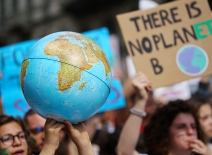Climate change is no longer just an environmental issue — it’s a human rights issue. From extreme weather to disrupted livelihoods, its impacts are already affecting workers and communities in global supply chains — especially in lower-income countries and high-risk sectors.
As businesses accelerate climate action, they must also take responsibility for the people most affected by the transition
A just transition ensures that environmental progress goes hand-in-hand with respect for workers’ rights. For responsible businesses, this means aligning climate goals with social impact — creating decent work, supporting skills development, and engaging workers in decision-making. It’s not just the right thing to do — it’s a strategic investment in long-term supply chain resilience.
Why this matters for responsible business
The link between climate change and human rights is becoming impossible to ignore. Climate risks — from rising temperatures to more frequent and severe floods — can create knock-on effects for workers if not anticipated and addressed. Meanwhile, new regulations are rapidly changing the expectations placed on global businesses.
Leading companies understand that human rights due diligence (HRDD) cannot be climate-blind. Embedding just transitions into HRDD processes helps identify future risks, protect business continuity, and demonstrate responsible leadership to investors, customers and regulators alike.
How ETI supports companies
ETI is helping businesses turn ambition into action. Our cross-sectoral approach and practical tools equip members to identify climate-related risks and integrate just transition into their responsible business strategies.
Current areas of work include:
- Briefings that explain and explore links between climate impacts and workers rights in global supply chains
- Convening members to explore the role of workers in emerging circular supply chains and increase commitment to transparency and decent work.
- Research into the human and workers’ rights implications of the transitions to sustainable agriculture.
- Support for social dialogue between workers and management in key industries.
We also convene companies, trade unions and civil society to build shared solutions and influence policy at national and global levels.

Just transitions is not just about managing environmental risk — it’s about delivering social and environmental justice in the era of climate and nature crisis — the two are inseparable. Responsible companies must act now to ensure that climate action uplifts workers rather than excludes them.
George Williams - Just Transitions Advisor, ETI
Why partner with ETI?
ETI offers more than insight — we offer influence, credibility and practical support. As a member, your business joins a unique alliance of leading brands, trade unions and NGOs committed to improving working conditions and advancing human rights in global supply chains.
We help you:
- Strengthen your HRDD to reflect climate and social risks
- Navigate emerging regulations and investor expectations
- Build more resilient and inclusive supply chains
- Engage meaningfully with suppliers and stakeholders
A just transition is fast becoming a hallmark of responsible business. By joining ETI, your company can lead the way — and do so in partnership with others shaping the future of global supply chains.
Just transitions


